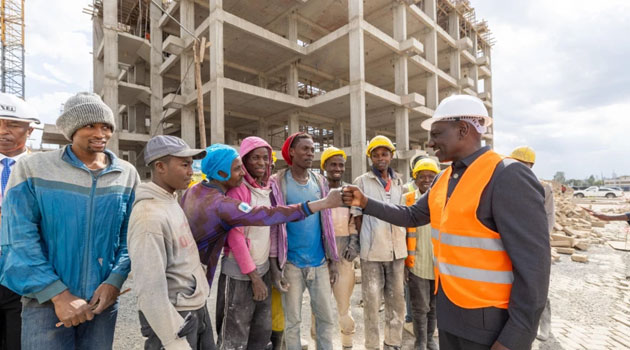
What the data really says » Capital News
NAIROBI, Kenya July 16 – President William Ruto’s latest push to absorb 4,000 young professionals into the Affordable Housing Programme has reignited the debate over whether his government is actually delivering on the ambitious job creation pledges it made or simply making more promises.
Speaking at State House during the launch of the Affordable Housing Internship Programme on Tuesday, President Ruto doubled down on his administration’s housing agenda, touting it as a key driver of youth employment.
The initiative targets graduates from universities and TVET institutions in fields like engineering, architecture, quantity surveying, law, accounting, and even emerging areas like AI and digital marketing.
“We want to bring on board another 4,000 professionals to scale up the level of supervision and accelerate the work we want to achieve,” said the President.
The message was clear: more jobs, more progress, more delivery.
Since 2023, the President has made bold claims about job creation tied to the Affordable Housing Programme.
By November 2024, he said 164,000 jobs had been created.
In December, the figure jumped to 200,000. Earlier in October, he claimed 140,000 youth were working under the project.
At face value, the numbers look promising. But when held up against independent data, cracks begin to show.
– Are these jobs real or just headlines? –
The 2025 Economic Survey paints a very different picture: the private construction sector, where most of the housing work happens, actually lost 2,900 jobs between 2023 and 2024.
Employment in that sector dropped from 226,300 to 223,400 raising serious doubts about whether the claimed jobs were ever real, or simply overstated.
And while thousands of housing units have reportedly been launched, only about 1,200 had been completed by the end of 2024, according to fact-checkers.
President Ruto’s affordable housing plan is meant to create jobs and fix the housing shortage as part of his Bottom-Up economic agenda.
But some Kenyans think it’s turning into a show, more about big numbers and launches than actual progress.
Kenyans are now asking: how many of these jobs are sustainable? How many are verifiable? And how many will be around once the cameras leave and the ground-breaking ceremonies end?
The President, however, insists the momentum is real.
He said firms working on housing have been overwhelmed and need more capacity as he urged professional bodies to come on board and mentor the young recruits.
“We believe what could be done in two years, we can now do in one,” Ruto said, promising faster delivery timelines and a structured mentorship system to help interns gain market-ready skills.
But for now, with rising unemployment and an economy under pressure, many are left wondering: is the housing project a true engine of jobs or just another promise waiting to be broken?